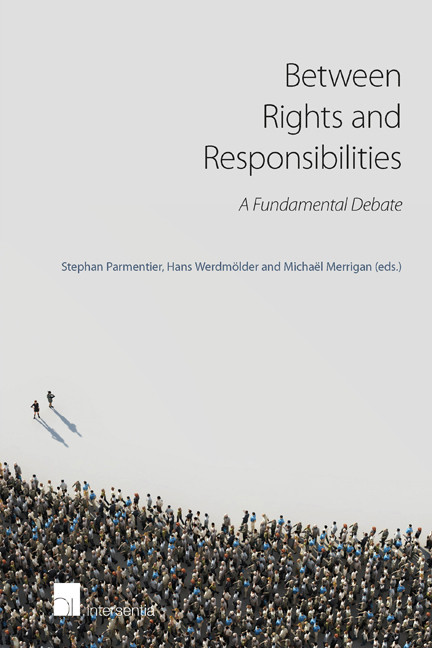Book contents
- Frontmatter
- Foreword
- Contents
- About the Authors
- Introduction: Towards an Integrated Vision of Rights and Responsibilities
- PART I FUNDAMENTAL RIGHTS AND FUNDAMENTAL RESPONSIBILITIES: SETTING THE SCENE
- Human Rights and Human Responsibilities. Setting the Ethical and the Conceptual Scene
- Rights, Responsibilities and Duties for the Civil Society. Moral Challenges Put Forward by the Millennium Development Goals
- Steering Clear of the Twin Shoals of a Rights-Based Morality and a Duty‑Based Legality
- Human Duties and Responsibilities for the Reinforcement of Human Rights. The Declaration of Human Duties and Responsibilities (1998)
- PART II RIGHTS AND RESPONSIBILITIES IN SPECIFIC CONTEXTS
- Declaration of Human Duties and Responsibilities
Rights, Responsibilities and Duties for the Civil Society. Moral Challenges Put Forward by the Millennium Development Goals
from PART I - FUNDAMENTAL RIGHTS AND FUNDAMENTAL RESPONSIBILITIES: SETTING THE SCENE
Published online by Cambridge University Press: 22 November 2017
- Frontmatter
- Foreword
- Contents
- About the Authors
- Introduction: Towards an Integrated Vision of Rights and Responsibilities
- PART I FUNDAMENTAL RIGHTS AND FUNDAMENTAL RESPONSIBILITIES: SETTING THE SCENE
- Human Rights and Human Responsibilities. Setting the Ethical and the Conceptual Scene
- Rights, Responsibilities and Duties for the Civil Society. Moral Challenges Put Forward by the Millennium Development Goals
- Steering Clear of the Twin Shoals of a Rights-Based Morality and a Duty‑Based Legality
- Human Duties and Responsibilities for the Reinforcement of Human Rights. The Declaration of Human Duties and Responsibilities (1998)
- PART II RIGHTS AND RESPONSIBILITIES IN SPECIFIC CONTEXTS
- Declaration of Human Duties and Responsibilities
Summary
INTRODUCTION
Human rights lawyers and human rights activists often hesitate or even hate to talk about human responsibilities and obligations (hereafter summarised as ‘duties’). This is the case for obvious reasons, which can best be understood in light of the very beginning of the history of human rights, relating to the protection of human beings against the abuse of power by States. Talking too much about duties of human beings (and their societal organisations) would be a nice ‘playing card’ in the hands of authoritarian governments, whether they are communist left, military right or religiously fundamentalist. In daily global reality one could and can find a lot of support for that fear. Think of the camps in the former Soviet Union and of today's developments in countries like North Korea and Iran. Also think of the grounds upon which in countries like China freedom of expression is dealt with: one is allowed to say everything, as long as it fits into the interests and views of the communist party.
Despite this, there might be good grounds to talk about human duties, alongside rights. This chapter addresses these duties of human beings and their non-governmental organisations towards other human beings and the world society as a whole. The focus will be upon a basically moral appeal connected to forms of accountability, and not upon new legally binding obligations. Further to that, the focus will be upon one selected issue: the need to realise the Millennium Development Goals (MDGs) and the human rights related thereto. Is the MDG reality ‘ordering’ us to rethink the notion of duties for not only States but for individuals and their organisations as well?
A FEW HISTORICAL REMARKS
Before entering into the question whether or not the MDGs raise the need to sharpen the notion of human duties in the context of human rights, it might be good to observe that already during the 1946–1948 negotiations on the Universal Declaration of Human Rights (UDHR) the issue of duties was discussed time and again. Already during the very first meeting of the drafting committee, it was proposed to formulate as a core principle of the Declaration ‘that man does not have rights only’, but also ‘owes duties to the society of which he forms part’.
- Type
- Chapter
- Information
- Between Rights and ResponsibilitiesA Fundamental Debate, pp. 35 - 50Publisher: IntersentiaPrint publication year: 2016



